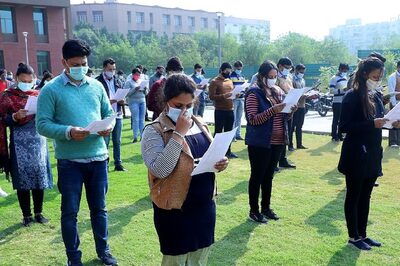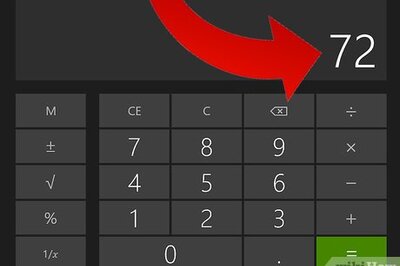
150
views
views
The application process will conclude on April 30.
Opening of application: February 24
Closing of application: April 30
Release of admit card: May 20
Date of exam: June 14, 9:00 am – 12:30 pm and 2:30 pm – 6:00 pm
Declaration of result: June 30.
NEST 2021: Exam pattern
NEST 2021 will be conducted in computer-based test mode. The question paper will have objective (MCQ) type questions 4 sections- Biology, Chemistry, Mathematics and Physics. Each section is of 50 marks each and will contain subject-specific. Candidates will have to attempt at least three sections and 4th section is optional based on their choice. The merit list for both the institutes will be prepared using the best 3 scores out of the four sections and the section with the least score will be excluded. The language of the question paper will be English only.
NEST 2021: Syllabus
NEST 2021 syllabus primarily follows the NCERT/CBSE science syllabus of class XI-XII. The detailed syllabus for NEST examination is provided below:
Biology: Cell Biology, Genetics and Evolution, Ecology, Humans and Environment, Biotechnology, Biology of Animal systems, Developmental Biology, Immunology, Biology of Plant systems, Systematics.
Chemistry: Physical Chemistry, Measurements in chemistry, Mole concept, Gaseous and liquid states, Atomic structure and chemical bonding, Thermodynamics – Thermodynamic states, Chemical equilibrium, Electrochemistry, Chemical kinetics, Solid-state, Solutions, Surface chemistry, Classification of elements and periodicity in properties, Hydrogen, s– Block elements, p– Block elements, Coordination compounds, Metals and metallurgy, Basic concepts, Reactive intermediates, Nomenclature, Alkenes and Alkynes, Aromatic compounds, Haloalkanes (Alkyl halides), Haloarenes, Alcohols, Phenols, Ethers, Aldehydes and Ketones, Carboxylic acids, Amines, Carbohydrate, Amino acids and proteins, Polymers.
Mathematics: Algebra, Quadratic equations with real coefficients, Arithmetic, geometric and harmonic progressions, Logarithms and their properties, Permutations and combinations, Addition and multiplication rules of probability, Trigonometry, Analytical geometry, Three dimensions, Differential calculus, Integral calculus, Vectors.
Physics: General, Design of some simple experiments, Graphical representation and interpretation of data, Mechanics, Law of gravitation, Rigid body, a moment of inertia, parallel and perpendicular axes theorems, Conservation of angular momentum, Hooke’s law and stress, Pressure in a fluid, Sound and mechanical waves, Thermal physics, Electricity and magnetism, Capacitance, Electromagnetic induction, Optics, Modern physics, Photoelectric effect.
The merit lists will be published separately for NISER and CEBS. A candidate is required to score equal to or above a total Minimum Admissible Percentile (MAP), to get a merit rank.
Read all the Latest News, Breaking News and Coronavirus News here. Follow us on Facebook, Twitter and Telegram.




















Comments
0 comment